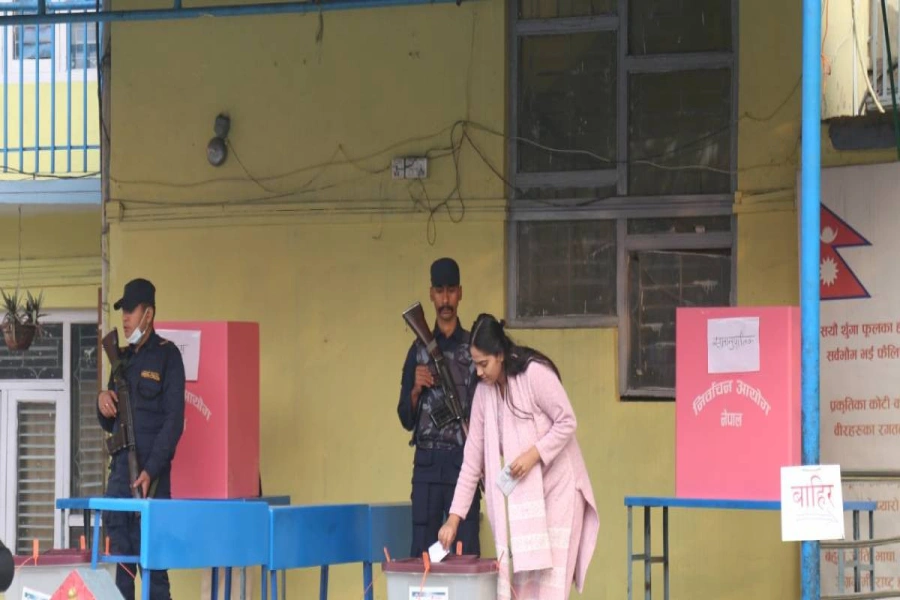KATHMANDU, May 5: Leaders of the Naya Shakti Party (NSP) led by former prime minister Baburam Bhattarai and Federal Socialist Forum Nepal (FSFN) led by Deputy Prime Minister and Health Minister Upendra Yadav have agreed to merge the two parties to form a new party, Samajbadi Party Nepal.
Issuing a joint statement on Saturday, Naya Shakti Coordinator Bhattarai and FSFN Chairperson Yadav announced that they have agreed to unify the two parties following a series of negotiations between the two sides.
According to the party leaders, both Bhattarai and Yadav will be chairpersons in the unified party, with Bhattarai as federal chairperson and Yadav as chairperson of the central committee.
“Former prime minister Bhattarai will be in first position in party protocol while Yadav will be second-in-command. Other details will be made public during the formal unification function slated for Monday at the Nepal Academy,” said Naya Shakti Party leader Parshu Ram Khapung.
Samajbadi Party Nepal will become the third largest party after the ruling Nepal Communist Party and the main opposition Nepali Congress.
FSFN and Naya Shakti unify as Samajbadi Party Nepal

The largest political party in Province 2, FSFN has 18 members in parliament while Naya Shakti has one member of parliament and one lawmaker in the provincial assembly of Province 3. After the merger, the new party will have the same number of seats in parliament as Rastriya Janata Party Nepal (RJPN).
The unification talks between the two parties had earlier stalled after Yadav’s FSFN declined to quit the government immediately, as demanded by Bhattarai.
Sources said Bhattarai and Yadav have agreed to issue an ultimatum to the Oli government for constitution amendment, instead of quitting the government immediately.
F
SFN has been pressing the government for constitution amendment to address the grievances of Madhes. “We have agreed to quit the government only if the government doesn’t agree to constitutional amendment within the ultimatum date,” said a FSFN leader.
Both parties have agreed on merging the existing central committees of the respective parties. FSFN has a 258-member central committee and Naya Shakti has one with 151 members. FSFN leaders said the secretariat of the unified party will comprise 36 percent leaders from the Bhattarai-led party. But this will be announced few days after the unification.
Leaders from the Bhattarai-led party have said that negotiations are still underway to bring the Rastriya Janata Party Nepal (RJPN) and the M S Thapa-led Janamukti Party into the to-be-formed Samajbadi Party, with a view to establish an alternative political force to the two major parties.
Earlier, Bhattarai held a meeting with RJPN and FSFN leaders over unification between the three parties.
FSFN’s Yadav established himself as a strong Madhesi leader after the Madhes movement of 2007 and formed the Madhesi People’s Rights Forum (MPRF), which emerged as the largest regional force in Madhes. Yadav had continued to use of the word ‘forum’ in his party’s name even after a merger with the Ashok Rai-led Sanghiya Samajbadi Party. Yadav has agreed that after the merger with Naya Shakti, he will drop that favorite word. ‘Forum’ has been used by most Madhes-based political parties.
The MPRF has suffered multiple splits. First a faction led by Bijay Kumar Gachhadar split away to form the Madhesi People’s Right Forum Democratic. Another faction led by Raj Kishor Yadav formed Madhesi People’s Right Forum Republic.
According to party leaders, Yadav wants to change the party’s identity into a national political force from just a regional one. FSFN has already had Madhesi and Indigenous/ Ethnic figures in the party.
Six other Madhes-based political parties dropped the words Tarai and Madhes from the name while merging and forming a new party, RJPN.
With the merger with the Bhattarai-led party, Yadav is eyeing votes from the Khas-Arya community as well, said party leaders.
Bhattarai had formed Naya Shakti in 2016 after severing ties with the Pushpa Kamal Dahal-led Maoist party following the promulgation of the new constitution.
After over a dozen central leaders rejoined the Dahal-led party, Bhattarai’s party was in an existential crisis and he was desperate for a merger to garner national party status.



































